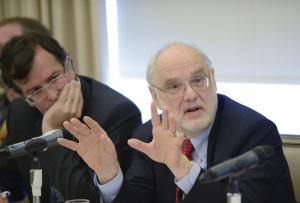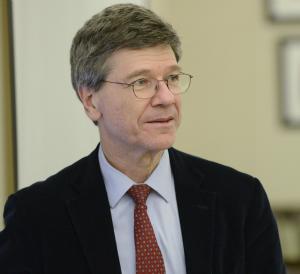How Should Foreign Investors and Host States Promote Sustainable Development?
Experts from government, academia, and the private sector debate the investor-state relationship at seventh annual Columbia International Investment Conference
New York, November 28, 2012—The era of ‘gunboat diplomacy’ is over, but what should a contemporary investor-state relationship look like today? And how does this paradigm affect international development?
These were some of the primary questions that dominated the robust debate at the seventh annual Columbia International Investment Conference hosted on November 14th and 15th by the Vale Columbia Center on Sustainable International Investment (VCC), a joint center of Columbia Law School and the Earth Institute of Columbia University. The conference drew several hundred policy makers, business leaders, civil society leaders, international lawyers, academics, and students with an interest in the issues.
VCC Director Lisa Sachs ’08 introduced the first panel of the two-day event, “Re-balancing Investor-State relationships,” welcoming audience participation and comments to promote a dynamic and inclusive conversation.
“Re-balancing” refers to the shift in common practices for international investment. The post-World War II era of decolonization was dominated by so-called gunboat diplomacy, as breakdowns in relations between states and foreign investors sometimes resulted in threats of or actual aggression by the investors’ home countries. By the 1990s, international norms progressed to the current model predicated on bilateral treaties promoting liberalization, strong protections for investors, and a system of investor-state dispute settlement that reduced the role of investors’ home states. Now, there are increasing questions regarding whether the equilibrium struck by that regime is the right one or needs to be further refined and, if so, how.
| Karl P. Sauvant |
Moderator Karl P. Sauvant, resident senior fellow at the Vale Columbia Center, asked panelists to discuss what forms a re-balanced relationship between multi-national corporations and host countries could take.
“I would not take it for granted that the [current] regime is going to survive,” argued panelist Howard Mann, senior international law advisor at the International Institute for Sustainable Development, predicting an era of rapid change. He argued that most bilateral investment treaties were between developed countries, where most of the investment originated, and developing countries. He said these treaties represent a paradigm that will no longer work, as countries like China increasingly become not only host countries but also substantial investors, creating a shared tension between business interests and government interests.
Mann argued for new agreements that account for the needs of civil society and cultural norms, starting from a perspective of promoting sustainable development.
W. Michael Reisman, Myres S. McDougal Professor of International Law at Yale Law School, disagreed with Mann’s prediction that there will and should be a shift away from current forms of investment treaties. He countered that the current bilateral treaty system is the best that has ever existed. He compared it to an era in recent history when multinational corporations could strong-arm local governments with violence.
Five panelists whose work is bound up in international business regulations responded to the debate between Reisman and Mann.
Kwadwo Owusu-Agyeman, Ghana’s deputy minister of lands and natural resources, stressed that mutual distrust between investors and states is the root of the imbalance of power. He said one mechanism for addressing that imbalance is for investors to invest heavily in local education and in capacity-building training not only for technical skills but also business and negotiation skills.
Laurent Coche, senior vice president sustainability of AngloGold Ashanti, said his company wanted to see more locally sourced labor and that investors should feel a sense of obligation to support education efforts, adding that his company had recently announced initiatives to promote local business acumen.
Sarah Anderson, the director of the global economy project at the Institute for Policy Studies, noted that there is widespread discontent among developing countries with the current bilateral treaty model. Five countries even have publicly denounced it and opted not to participate.
Daniel Bahar, deputy assistant U.S. trade representative for investment in the Office of the U.S. Trade Representative, discussed new developments in America’s model Bilateral Investment Treaty, amended in April after a three-year review process. He said that the U.S. has continued to maintain a “centrist” approach to balancing its commitments to protect U.S. investors abroad while giving host countries adequate freedom to implement legitimate regulations.
M. Sornarajah, CJ Koh professor of law at the National University of Singapore, stressed that the outsized role played by large international law firms in negotiating contracts must be diminished because host countries do not have the resources to engage in similar legal wrangling, either during the contracting phase or when resolving complaints. He argued for more independent arbitration bodies with finite time limits on the process of conflict resolution.
Subsequent panel discussions at the conference explored the issues of predictability versus flexibility in investor-state relationships, mitigating and managing arbitration and disputes, and situating the investor-state relationship within the broader objectives of risk mitigation and sustainable development.
| Professor Jeffrey Sachs, The Earth Institute at Columbia University |
Throughout the discussions, panelists and participants highlighted new developments and lessons learned and suggested concrete steps for addressing persistent challenges in international investment. Jeffrey Sachs, director of The Earth Institute at Columbia University, gave the keynote address about how corporate tax havens foster rising global inequality, negatively impacting democracy and creating an “absolute crisis.”
The Vale Columbia Center on Sustainable International Investment’s mission is to develop and disseminate practical approaches and solutions to maximize the impact of international investment for sustainable development.

